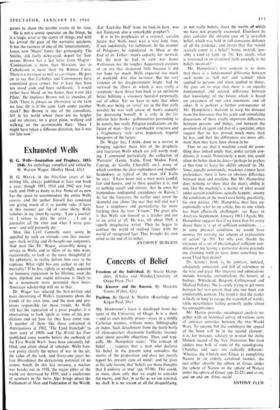Concepts of Belief
The Knower and the Known. By Marjorie Grene. (Faber, 42s.) MR. HAMPSHIRE'S latest is developed from lec- tures at the University of Otago. It is a short —and as such notably pricey—essay in a mildly Cartesian manner, without notes, bibliography or index. Such detachment from the hurly-burly of close-quarters discussion facilitates insouci- ance about possible objections. Thus, and typi- cally, Mr. Hampshire states: The concept of belief . . . requires that a man who declares his belief in the present tense considers the merits of the proposition and does not merely report his present state of mind'; and he gives as his sole reason, that 'beliefs are those thoughts that I endorse as true' (pp. 97-98). This could, at most, show only that we ought to consider the merits, and that, in so far as we are rational, we shall. It is no reason at all for disqualifying, as not really beliefs, those the merits of which we have not properly examined. Elsewhere he does consider the extreme case of 'a so-called belief, which was held in full conscious defiance of all the evidence,' and insists that this 'would scarcely count as a belief'; being. instead, 'pos- sibly a kind of faith' (p. 79). Yet, surely, what is irrational in an irrational faith precisely is the beliefs involved?
Mr. Hampshire's first concern is to show that there is a fundamental difference between such terms as 'will not' and 'cannot' when applied to persons and when applied to things. He goes on to urge that there is an equally fundamental, and related, difference between that knowledge of the future which is based on awareness of our own intentions and all other. It is perhaps a further consequence of Mr. Hampshire's decision to keep his distance from the literature that his acute and stimulating discussions of these vitally important differences between persons and things, and between the position of an agent and that of a spectator, often suggest that he has proved much more than he has, and that the differences are more ulti- mate than they have been shown to be.
Thus to say that a machine could do some- thing does indeed imply that, under certain con- ditions, it would. Notoriously a man, too, could often do better than he does—'perhaps he prefers at this time to leave his ability unused' (p. 28). Since, equally notoriously, machines cannot have preferences, there is here an obvious difference between man and machine. But Mr. Hampshire does nothing to show that the man's ability is not, like the machine's, a matter of what would under certain conditions actually happen: among the conditions in the man's case being, peculiarly, his own desires. (Mr. Hampshire does here ex- ceptionally refer to an article, but to one which has been effectively challenged: see Baier in Analysis, Supplement, January 1963.) Again, Mr. Hampshire suggests that if we knew that for every desire there is 'a set of sufficient conditions . . . in some physical condition, we would have motives for revising our scheme of explanation of action' (p. 50). Yet why ever should the existence of a set of physiological sufficient con- ditions of my having a particular desire preclude my claiming trulr to have done something be- cause I had that desire?
Dr. Grene's book is, by contrast, indexed, adequately annotated, and full of references to the wise and great. Her interests and admirations include Aristotle, existentialism, the history of biology, Whitehead, Bergson, Collingwood and Michael Polanyi. She is surely trying to get more between her two covers than any one book can comfortably contain. The result is that the reader is likely to long to escape the waterfall of words; while nevertheless feeling properly guilty about his unreceptiveness.
Mr. Martin provides sociological analysis to- gether with an historical survey of various sorts of anti-war activities between the two World Wars. To anyone but the sociologist the appeal of the book will be in the second element: it is, for instance, salutary to re-read the shifty Munich record of the New Statesman. But even addicts may balk at some of the sociologising. Churches and sects are radically different: 'Whereas the Church sees Grace as completing Nature in an orderly canalised manner, the sect either absorbs the sphere of Grace under the sphere of Nature or the sphere of Nature under the sphere of Grace' (pp. 22-23); and so on; and on and on. Ohne micld
ANTONY FLEW


































 Previous page
Previous page